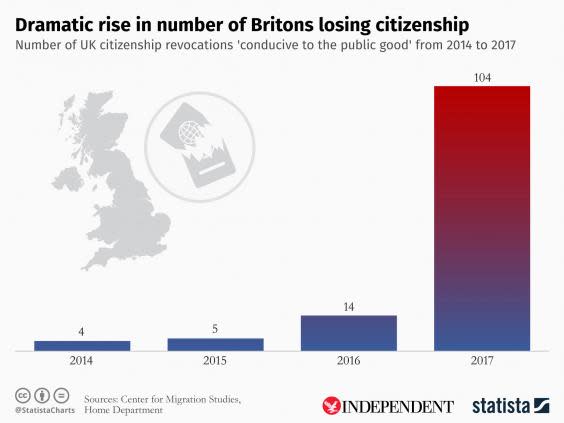Shamima Begum: Sajid Javid defends stripping Isis bride of UK citizenship amid mounting pressure
Sajid Javid has defended his decision to strip Shamima Begum’s British citizenship amid a diplomatic row with Bangladesh.
The home secretary insisted he would “not leave anyone stateless” after officials in Dhaka said the 19-year-old mother was not a Bangladeshi national and would not be allowed to enter the country.
"I'm not going to talk about an individual, but I can be clear on the point that I would not take a decision and I believe none of my predecessors ever have taken a decision that at the point the decision is taken would leave that individual stateless,” Mr Javid told ITV’s Robert Peston. "My number one job is to do whatever I can to keep this country safe and I admit that sometimes when you make these decisions they are not easy decisions.
"They can be very tough decisions, so many things to weigh up about the mortality of a decision, the legality of a decision, how it can have a huge impact on someone's life.”
His comments came after MPs questioned why Ms Begum was not being repatriated to Britain for potential prosecution.
Labour MP David Lammy wrote on Twitter: “Stripping individuals of citizenship sets a very dangerous precedent. We should take responsibility for our own citizens and try them for crimes in British courts, not leave them stateless. This is the rule of law.”
Radio presenter and counter-extremist Maajid Nawaz said the order had made British people of immigrant heritage “second-class citizens”.
He said: “If citizenship is revocable for people like me, it was never citizenship to begin with – it was nothing but a visa."
Lord Anderson, the former independent reviewer of terrorism legislation, said deprivations “effectively bring about two classes of citizenship”.
Speaking on Radio 4’s Today programme, he pointed out that if he fought for Isis in Syria he would retain the legal right to return to Britain, but someone of Pakistani or Bangladeshi heritage would not.
Fahad Ansari, a lawyer who represented two men of Bangladeshi heritage who won appeals against citizenship deprivation last year, said the application of the power had been “inherently racist and discriminatory”.
Mr Javid said he would consider other tools when possible but “in some circumstances, the only reasonable way left to protect this country is to make sure someone cannot re-enter it”.

He added: “I will not hesitate to remove their nationality if it is the only option left for me to protect everyone that lives in the UK."
A lawyer representing Ms Begum’s family said they would be launching a legal challenge.
Tasnime Akunjee told The Independent that the teenager had been left “to all practical purposes stateless”.
She was born in the UK and never visited Bangladesh or possessed a passport from the country, he added.
Ms Begum meanwhile, told ITV News she was “shocked” by the move and suggested she would explore how to gain Dutch nationality through her husband, who is an Isis fighter from the Netherlands.
Dhaka’s ministry of foreign affairs said Ms Begum was not a Bangladeshi citizen and “there is no question of her being allowed to enter into Bangladesh”.
Mr Javid had earlier insisted that all citizenship deprivations were “not only conducive to the public good, but legally proper and correct, and compliant with both international and any relevant domestic law.”
He suggested that Ms Begum's baby will remain a British citizen, telling MPs: “If a parent does lose their British citizenship, it does not affect the rights of their child.”
The shadow home secretary Diane Abbott highlighted that Article 15 of the Universal Declaration of Human Rights says “everyone has the right to a nationality” and that “no-one shall be arbitrarily deprived of their nationality”.
The number of people stripped of British citizenship for the “public good” has soared by more than 600 per cent in a year.
Ms Begum is one of more than 150 people subjected to the measure since 2010, with the number rocketing from 14 people in 2016 to 104 in 2017.

 Yahoo News
Yahoo News 